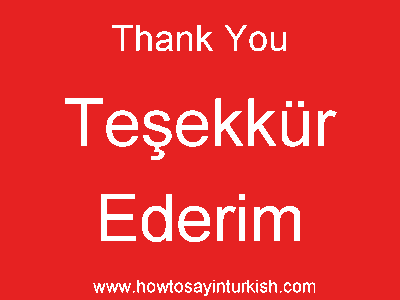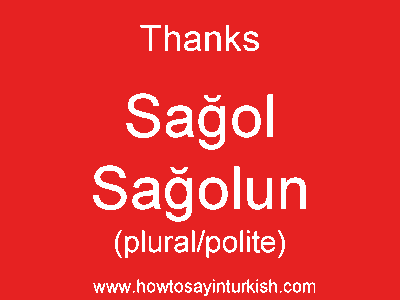How To Say "Thank You" In Turkish: Express Your Gratitude Like A Local
Introduction
If you're planning to visit Turkey or the Turkish-speaking part of Cyprus (the north), or if you have Turkish friends, you will quickly notice that the Turkish people are incredibly polite. Saying "thank you" is an essential part of their daily interactions. However, did you know there's more than one way to express gratitude in Turkish? In this blog post, we'll explore the various ways to say "thank you" in Turkish, from formal to casual expressions, so you can blend in with the locals and connect on a deeper level.
Understanding the Basics
The most common way to say "thank you" in Turkish is "teşekkür ederim." This formal expression is widely used in everyday conversations. However, Turkish is a rich language with many nuances, and there are several other ways to express gratitude depending on the context and your relationship with the person you're speaking to.
Formal Expressions
- Teşekkür ederim: This is the most widely used formal expression for "thank you" in Turkish. It literally means "I thank you" and is appropriate in almost any situation.
- Teşekkürler: A shorter and slightly less formal version of "teşekkür ederim." It means "thanks" and is often used in casual settings.
These formal expressions are perfect for situations where you want to show respect, such as in business settings or when speaking to someone older or in a position of authority.
Casual Expressions
When interacting with friends, family, or acquaintances, you might want to use a more casual way to say "thank you." One of the most common informal expressions is "sağol." Let's break it down:
- Sağol: This expression is widely used among friends and family. The word "sağ" means "alive" and "ol" means "to be." Together, "sağol" can be loosely translated as "stay alive" or "be well," which is a warm and friendly way to express gratitude.
Using "sağol" instead of "teşekkür ederim" can make your conversations feel more natural and friendly, especially in casual settings.
Special Phrases for Unique Situations
Beyond the standard "thank you" expressions, Turkish has some unique phrases that are used in specific situations:
Elinize Sağlık
- Elinize sağlık: This phrase is used to thank someone for their hard work or effort, especially when they've prepared something for you, like a meal. It roughly translates to "bless your hands" and is a beautiful way to show appreciation for someone's efforts.
This phrase is particularly useful when you're at someone's home and they've gone out of their way to make you feel welcome. It shows that you recognize and value their effort.
Usage Tips and Examples
Now that you know the different ways to say "thank you" in Turkish, let's look at some examples and tips for using them effectively:
Formal Situations
- When meeting someone for the first time or in a professional setting, use "teşekkür ederim" to show respect and gratitude.
- Example: If someone offers you a business card, you can say, "Teşekkür ederim" as you accept it.
Casual Situations
- When hanging out with friends or family, use "sağol" to make the conversation feel more relaxed and friendly.
- Example: If a friend gives you a gift, you can say, "Sağol" to express your thanks.
Special Occasions
- For special occasions or when someone has put in extra effort, use "elinenize sağlık" to show your deep appreciation.
- Example: If someone cooks a delicious meal for you, you can say, "Elinize sağlık" to thank them for their hard work.
Learning the Language
As a Turkish learner, using the right phrases to express appreciation can help you connect with locals and build beautiful friendships. It's not just about learning the words; it's about understanding the culture and showing respect for the language.
Why Learn Turkish?
Learning how to say "thank you" in Turkish is just the beginning. By mastering the language, you open yourself up to a world of opportunities to connect with people, experience new cultures, and deepen your understanding of the world around you.
Conclusion
In this blog post, we've explored the various ways to say "thank you" in Turkish, from formal expressions like "teşekkür ederim" to casual phrases like "sağol" and special occasions where "elinenize sağlık" is appropriate. By using the right expressions in the right context, you can show your appreciation and respect for the Turkish culture. Remember, learning a language is about more than just memorizing words; it's about understanding the people and their traditions. So, whether you're visiting Turkey, speaking with Turkish friends, or simply interested in the language, saying "thank you" in Turkish is a great way to start building meaningful connections.
Summary
To summarize, there are several ways to say "thank you" in Turkish, including formal expressions like "teşekkür ederim" and casual phrases like "sağol." Depending on the context and your relationship with the person you're speaking to, you can choose the most appropriate way to express your gratitude. Additionally, special phrases like "elinenize sağlık" can be used to show appreciation for someone's hard work or effort. By learning these expressions and understanding their usage, you can connect with Turkish people on a deeper level and build lasting friendships.
- Where To Watch Viral Mms
- Mkvcinemas Com 2024
- Ian Anderson Daughter
- Jackerman Mothers Warmth 3 A Journey Into The Heart Of Parenting
- Caitlin Clark Nude Shower

How do you say "Hello" and "Thank You" in Turkish? : How to say in Turkish

Как сказать спасибо по турецки: 4 шагов

How do you say "Hello" and "Thank You" in Turkish? : How to say in Turkish